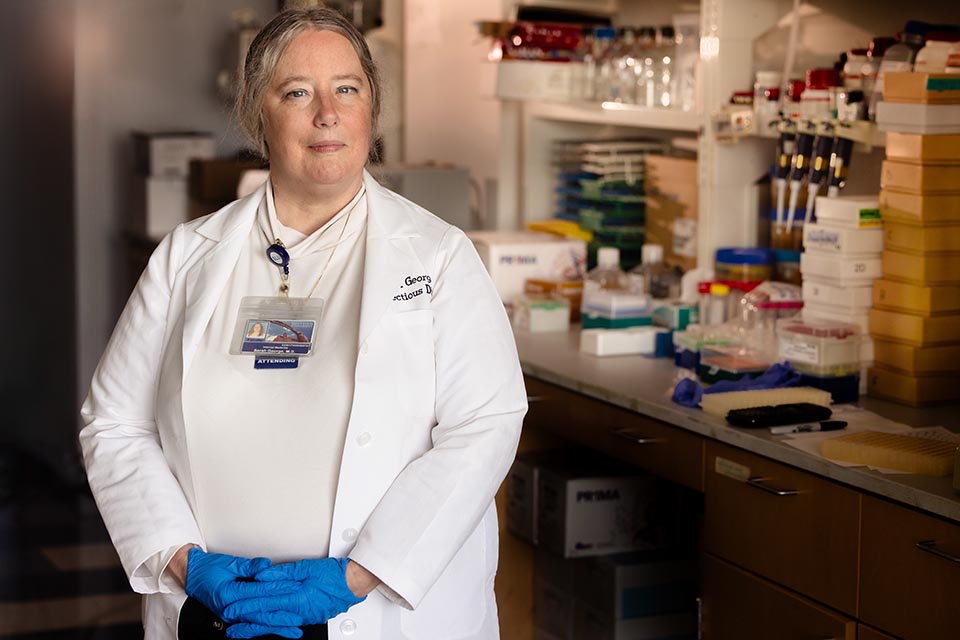SLU Study: Black Patients with Heart Failure Less Likely to Receive Palliative Care
11/12/2024
ST LOUIS — A study by researchers at Saint Louis University shows that only one in eight patients with heart failure in the United States receive palliative care consultations within five years of diagnosis.
Recently published in the Journal of the American Heart Association, the study highlights the alarmingly low uptake of palliative care among adults with heart failure in the U.S., especially compared to patients with similarly fatal cancers. The study also highlighted significant racial and geographic disparities. Black people were 15% less likely to receive palliative care compared to their white counterparts.

Zidong Zhang, Ph.D., biostatistician at the AHEAD Institute at Saint Louis University School of Medicine. Photo by Sarah Conroy.
This disparity is particularly concerning given the higher risk and mortality rates for cardiovascular disease in the Black population. Over the past decade, the American Heart Association (AHA) and the European Society of Cardiology have recommended integrating palliative care into managing heart failure.
"However, anecdotal reports suggest that most patients with heart failure do not receive palliative care, and those who do typically receive it only in the last two to three weeks of life," said Zidong Zhang, Ph.D., biostatistician at the AHEAD Institute at SLU's School of Medicine, the paper's senior and corresponding author.
Zhang, a health service researcher focusing on palliative and patient-centered care for cardiovascular disease and cancer, has presented his research on patient outcomes at national conferences and published his findings in peer-reviewed journals.
"To our knowledge, this is the first study to investigate the uptake of palliative care consultation following a heart failure diagnosis in the general U.S. population. Unlike the previous studies focusing on Medicare beneficiaries or veterans, our research provides a more general insight into early palliative care integration for heart failure across the entire nation," he explained.
In this retrospective study, Zhang and his co-authors analyzed data from a national all-payer database covering 2011 to 2018. The study cohort included nearly 170,000 patients aged 18 to 80 from all country regions. Some of them had advanced heart failure or even had received advanced therapies such as left ventricular assist devices or cardioversion. Additionally, the study also demonstrated the heterogeneity in the relationship between receiving palliative care and treatment options for acute heart failure and heart failure worsening.
Zhang and his co-authors found that patients who did not have cardiogenic shock, a life-threatening condition in which your heart suddenly can't pump enough blood to meet your body's needs, but received inotropic therapy, drugs that tell your heart muscles to beat or contract with more power or less power, were less likely to have palliative care consultations. However, among patients treated for cardiogenic shock with advanced therapies, the likelihood of receiving palliative care almost tripled. Zhang and his co-authors attributed this discrepancy to the intended purpose of treatment and clinical inertia in managing complex cases.
Zhang said the latest AHA guidelines emphasize the early integration of palliative care consultation for all patients with heart failure, particularly when evaluating patients for advanced therapies. Study data shows a significant gap between these recommendations and real-world practice. Zhang said there's a need for systemic reform to achieve early integration of palliative care and timely consultation.
"These might include removing barriers in the payment system for concurrent care, assisting physicians in determining when to initiate the palliative care conversation with patients, and, in a health system, expanding outpatient and community-based palliative care service and streamlining the referral and transition of palliative care from cardiac care to inpatient service to community," he said.
Other authors include Divya S. Subramaniam, Ph.D., of Department of Health and Clinical Outcomes and the AHEAD Institute, Saint Louis University School of Medicine; Steven W. Howard, Ph.D., of University of Alabama at Birmingham; Kenton J. Johnston, Ph.D., of Department of Internal Medicine, Washington University School of Medicine; William H. Frick, M.D., of Department of Internal Medicine, Saint Louis University School of Medicine; Kimberly Enard, Ph.D., of College for Public Health and Social Justice, Saint Louis University; and Leslie Hinyard, Ph.D., of Department of Health and Clinical Outcomes and the AHEAD Institute, Saint Louis University School of Medicine.
Latest Newslink
- SLU Launches William L. Clay, Sr. Institute of Civic Engagement and Economic JusticeThe Clay Institute will provide immersive learning experiences and hands-on training that address the social and economic challenges facing the St. Louis region and the nation. Institute programming will be available to all students with an interest in civic engagement and democratic participation.
- SLU Research Explores Depression's Ripple Effect on DiabetesA study conducted by researchers at Saint Louis University found that patients with depression were more likely to have uncontrolled diabetes over time and that depression contributes to a heightened economic burden to diabetes management.
- SLU/YouGov Poll: Statewide Cell Phone Ban for Missouri Schools Popular with VotersGovernor Mike Kehoe has signed Senate Bill 68 into law, enacting a statewide ban on the use of personal electronic devices, including cell phones, tablets, and smartwatches, throughout the school day in Missouri public and public charter schools.
- SLU Vaccine Center Will Enroll Healthy Volunteers in Yellow Fever Vaccine Clinical TrialSaint Louis University's Center for Vaccine Development will enroll up to 70 adult volunteers in a clinical trial to study the safety elicited by a new investigational vaccine for yellow fever, a potentially deadly disease that is spread by mosquitoes. The research is funded by Sanofi Pasteur.
- Feser Joins Global Jesuit Assembly During First Week as SLU's PresidentAs he began his tenure as Saint Louis University's 34th president, Edward Feser, Ph.D., represented SLU as a delegate at the 2025 Assembly of the International Association of Jesuit Universities (IAJU).
- SLU Partnership with St. Louis Catholic Academy Middle School Education Yields Improved Outcomes One Year OnA partnership between Saint Louis University's School of Education's Herrmann Center for Innovative Catholic Education and St. Louis Catholic Academy has yielded improved test scores and student outcomes in the middle school population after its first year. The SLU School of Education provides resources to St. Louis Catholic Academy's middle school.













